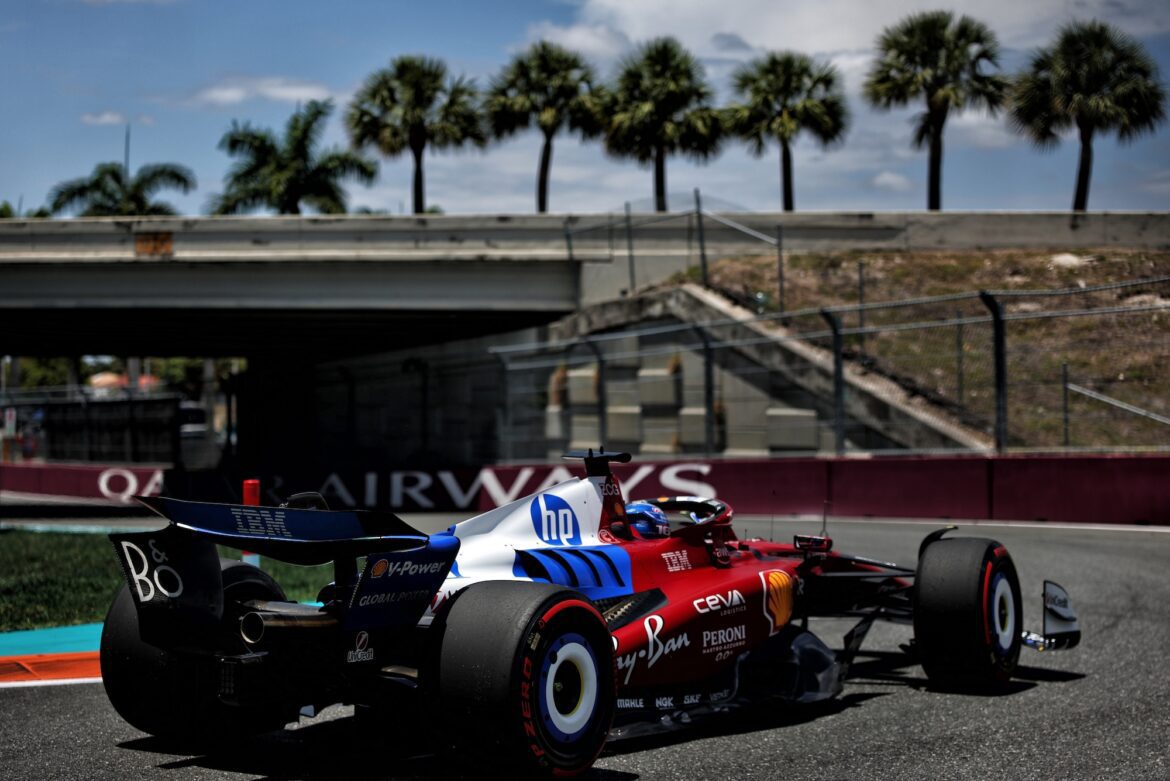Ferrari’s Challenges: Charles Leclerc’s Candid Reflections on Performance at the Miami GP
Charles Leclerc, the talented Monegasque driver, has been quite open about Ferrari’s performance following a disappointing qualifying session during the Sprint for the Miami Formula 1 Grand Prix. Leclerc is set to start the race from sixth position, a placement that left him far from pleased. While he managed to outpace his teammate, Lewis Hamilton, who finished seventh, Leclerc didn’t shy away from expressing his discontent regarding the SF-25’s competitiveness on the American track.
When asked about his feelings after the session, Leclerc offered a blunt assessment: “Bad.” He elaborated, saying, “The lap was good, but the pace simply isn’t there at the moment. It’s a bit frustrating, but that’s the reality. I will try to do something special at the start, but to be honest, there’s not much room for improvement. This is the car’s pace.”
Ferrari’s start to the season has been anything but consistent. Although Leclerc secured a third-place finish in Saudi Arabia, which brought a momentary sense of optimism, the team continues to grapple with finding stability. In Miami, Leclerc acknowledged that the issues plaguing the car are not limited to a specific section of the track; rather, they are pervasive.
“It’s in every corner, actually,” the 27-year-old driver stated. “It’s not like we are particularly weak in one type of corner. Yes, low-speed corners seem to be a bigger weakness, but that varies from weekend to weekend, so it’s not very encouraging,” he concluded, visibly frustrated.
Leclerc’s straightforward analysis sheds light on the ongoing challenges Ferrari faces in establishing itself as a consistent contender for top positions in Formula 1. The team has experienced ups and downs, illustrating the complexities of modern racing where technology and driver skill must work in perfect harmony to achieve success.
As the Formula 1 season unfolds, the spotlight remains on Ferrari’s performance. Fans and analysts alike are eager to see whether Leclerc and his team can find the right balance to turn their fortunes around. The competition is fierce, and every fraction of a second counts, making it imperative for Ferrari to address its shortcomings swiftly.
In the realm of high-stakes motorsport, analysis of car performance goes beyond just the numbers. It involves understanding the intricate dynamics of aerodynamics, tire management, and driver feedback. For Ferrari, this task is compounded by the expectations that come with their storied history in the sport. The team has long been synonymous with excellence, and the pressure to perform adds another layer of complexity to their efforts.
The Miami Grand Prix is a unique event, featuring a circuit that offers a mix of straights and tight corners, demanding a versatile car setup. Teams must adapt quickly to the specific challenges presented by each race venue. For Ferrari, the inability to extract optimal performance from their car in Miami highlights the need for continuous development and refinement.
Leclerc’s comments also point to a broader issue within the team’s strategy. The current season requires not only a fast car but also a cohesive strategy that allows drivers to maximize their potential on the track. As the team looks to improve, it will be essential for them to analyze data thoroughly, identify weaknesses, and implement effective changes in a timely manner.
Moreover, the psychological aspect of racing cannot be underestimated. Drivers thrive on confidence, and consistent performance builds that confidence. For Leclerc, the frustration with the car’s pace could potentially affect his mindset as the season progresses. Finding ways to maintain a positive outlook while tackling technical challenges will be crucial for him and the team.
Looking ahead, Ferrari’s engineering team must focus on the car’s setup for the upcoming races, ensuring that the SF-25 is capable of competing at a higher level. This includes fine-tuning the aerodynamics, adjusting suspension settings, and optimizing tire strategies to gain an edge over competitors. Each race presents an opportunity for the team to learn and adapt, and the lessons learned in Miami could prove invaluable as they move forward.
As for Leclerc, his determination to improve and his willingness to confront reality head-on will be essential as he navigates the challenges of the season. The Miami Grand Prix serves as a critical juncture for Ferrari, and the team must rally together to harness their strengths while addressing their weaknesses.
In the competitive arena of Formula 1, every detail matters. The pursuit of excellence is relentless, and teams must remain agile in their approach. For Ferrari, the road ahead is fraught with challenges, but it also offers the potential for redemption and success. Leclerc’s candid reflections shed light on the uphill battle the team faces, but they also underscore the resilience and determination that define the spirit of Formula 1.
As the world watches the unfolding drama of the season, fans will be eager to see how Ferrari adapts and evolves in response to their current challenges. The pressure is on, and with each race, the stakes grow higher. The journey ahead promises to be filled with excitement, unpredictability, and the relentless pursuit of victory that characterizes the essence of Formula 1 racing.
In conclusion, Ferrari’s trajectory in the 2023 season remains uncertain, but with committed drivers like Charles Leclerc and a dedicated engineering team, there is hope for improvement. The Miami Grand Prix may have been a setback, but it serves as a vital learning experience that could pave the way for future success. As the team refines its approach, it will be interesting to see how they adapt and respond in the races to come.
